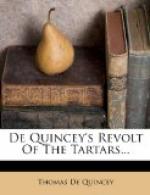Thus, after their memorable year of misery, the Kalmucks were replaced in territorial possessions, and in comfort equal, perhaps, or even superior, to that which they had enjoyed in Russia, and with superior political 30 advantages. But, if equal or superior, their condition was no longer the same; if not in degree, their social prosperity had altered in quality; for, instead of being a purely pastoral and vagrant people, they were now in circumstances which obliged them to become essentially dependent upon agriculture; and thus far raised in social rank that, by the natural course of their habits and the necessities of life, they were effectually reclaimed from roving and from the savage customs connected with a half 5 nomadic life. They gained also in political privileges, chiefly through the immunity from military service which their new relations enabled them to obtain. These were circumstances of advantage and gain. But one great disadvantage there was, amply to overbalance all other 10 possible gain: the chances were lost, or were removed to an incalculable distance, for their conversion to Christianity, without which in these times there is no absolute advance possible on the path of true civilization.
One word remains to be said upon the personal interests 15 concerned in this great drama. The catastrophe in this respect was remarkable and complete. Oubacha, with all his goodness and incapacity of suspecting, had, since the mysterious affair on the banks of the Torgau, felt his mind alienated from his cousin; he revolted from the man 20 that would have murdered him; and he had displayed his caution so visibly as to provoke a reaction in the bearing of Zebek-Dorchi and a displeasure which all his dissimulation could not hide. This had produced a feud, which, by keeping them aloof, had probably saved the life of 25 Oubacha; for the friendship of Zebek-Dorchi was more fatal than his open enmity. After the settlement on the Ily this feud continued to advance, until it came under the notice of the Emperor, on occasion of a visit which all the Tartar chieftains made to his Majesty at his hunting 30 lodge in 1772. The Emperor informed himself accurately of all the particulars connected with the transaction—of all the rights and claims put forward—and of the way in which they would severally affect the interests of the Kalmuck people. The consequence was that he adopted the cause of Oubacha, and repressed the pretensions of Zebek-Dorchi, who, on his part, so deeply resented this discountenance to his ambitious projects that, in conjunction with other chiefs, he had the presumption 5 even to weave nets of treason against the Emperor himself. Plots were laid, were detected, were baffled; counter-plots were constructed upon the same basis, and with the benefit of the opportunities thus offered. Finally, Zebek-Dorchi was invited to the imperial lodge, 10 together with all his accomplices; and, under the skilful management of the Chinese nobles in the Emperor’s establishment, the murderous artifices of these Tartar chieftains were made to recoil upon themselves, and the whole of them perished by assassination at a great imperial 15 banquet. For the Chinese morality is exactly of that kind which approves in everything the lex talionis:




